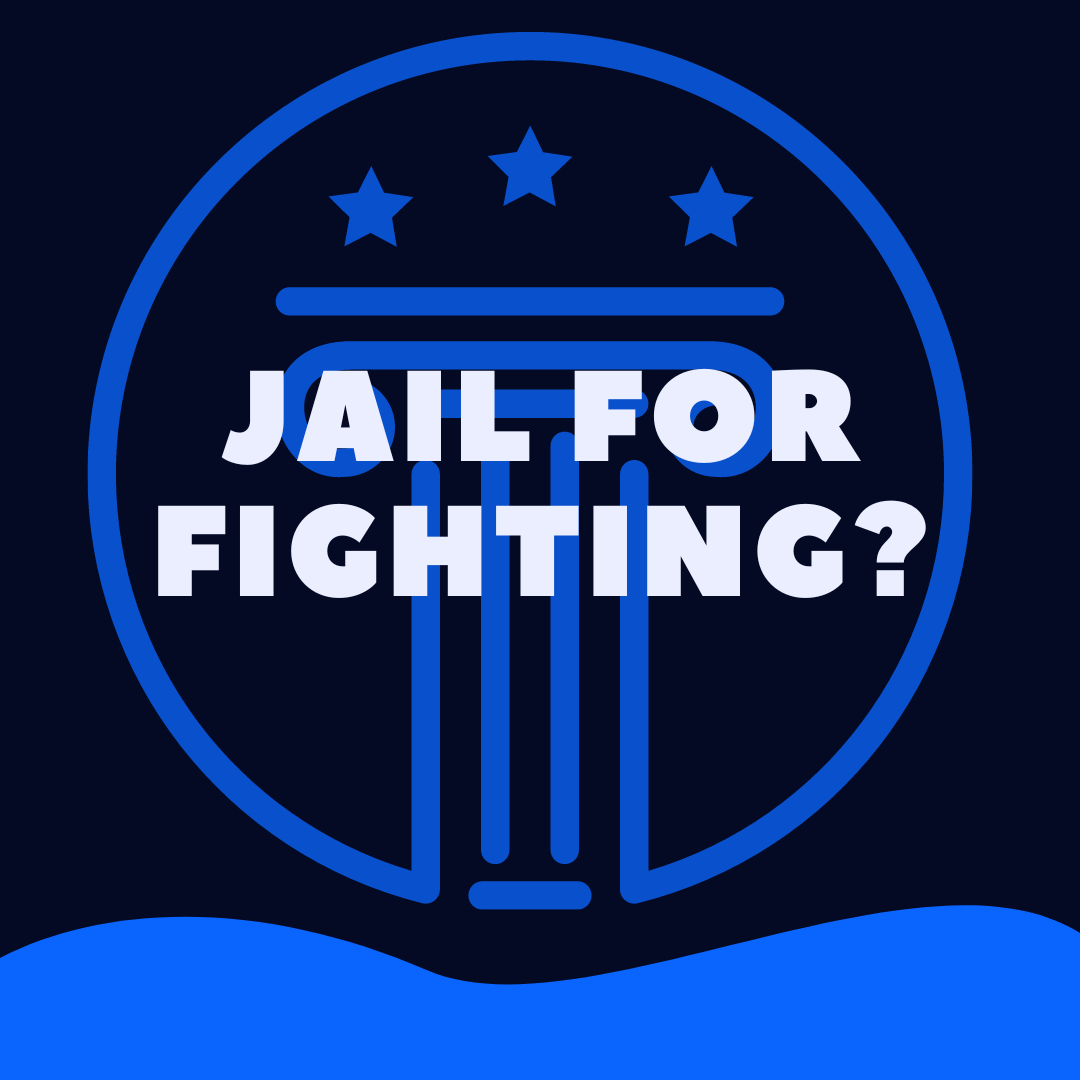Answer: yes, you can go to jail for fighting.
In the article that follows, we’ll explain.
Can You Go To Jail For Fighting? (Explained)
Disclaimer
The contents of this web page are for informational purposes only, and nothing you read is intended to be legal advice. Please review our disclaimer about law/legal-related information on this website before taking action based upon anything you read or see.
Introduction To Fighting Crimes
The criminal implications for fighting are actually quite broad.
It depends heavily upon the circumstances of the fight, and the outcome of the fight.
Most states have established misdemeanor and felony offenses to penalize the various outcomes of a fight, though some states may make the lesser fights a civil infraction (like a ticket).
For misdemeanor and felony offenses, jail is a possible punishment, though the maximum jail sentence varies with the seriousness of the offense (and the state).
For civil infractions, jail is not a potential penalty.
In a fight, the parties touch each other, hurt each other, touch other people, hurt other people, cause a public disturbance, and cause damage to property they do not own.
Potential charges include:
- Physical Harassment: offensive physical touching that doesn’t involve injury
- Assault: physical touching that involves pain or injury, and the seriousness of the assault charge increases depending on the amount of pain or injury caused
- Reckless Endangering: putting other people in harms way due to behavior
- Criminal Mischief: for causing property damage, and gets more serious the more damage is caused
- Disorderly Conduct: for all the disruption, shouting, noise, and hullabaloo
All of these charges have jail as a potential outcome.
If the fight turns into something even more serious, one or both of the fighters could be charged with attempted murder.
The fighters could also be charged with assault or attempted assault for hitting or trying to hit individuals trying to break up the fight, like bar owners or bouncers.
Public intoxication is another potential offense if the fight involved alcohol.
If the fight involved any sort of racial targeting, various ‘hate crimes’ could also be charged.
Will You Go To Jail For Fighting?
While jail is a possibility in any fighting case, whether the parties (one or both) actually go to jail is much more nuanced.
First of all, the prosecutor has to make charging decisions.
The circumstances of the case, as well as whether some of all of the witnesses were intoxicated at the time of the incident, will influence the prosecutor’s decision to move forward.
He has to believe he can prove the charged offenses beyond a reasonable doubt. And if he can’t do it with the evidence he has, then he won’t move forward.
But let’s say one or both of the fighters get charged with crimes.
Offenders do not go to jail automatically for breaking the law every single time.
Instead, during sentencing process, many factors are considered, such as:
- how bad the fight was
- how badly anyone was hurt
- how much property was damaged
- whether self-defense was involved
- whether the offender is prepared to pay for damages
- whether this is a first offense
- the most recent previous criminal conviction, and how many previous convictions there are
- whether the offender is remorseful
- whether jail will cause the offender to lose his job or place in school
- whether the offender is prepared to enter substance abuse treatment
The judge will make the decision as to whether jail is appropriate in the circumstances, or whether the offender would be better suited to performing community service or other service under the eye of the jail, such as trash clean up/road crew.
The parties (prosecutor and defense) may even negotiate a sentence that seems appropriate and jointly recommend it to the court for consideration.
Thus, jail is definitely a possibility when a fight occurs, but it is hard to say whether jail will result without knowing the global set of circumstances for those involved.
What If Self-Defense Was Involved?
Self-defense is not a get out of jail free card, and it won’t stop a prosecutor from filing criminal charges against an individual.
Instead, the doctrine of ‘self-defense’ is an affirmative defense, meaning that defendant asserts it during the trial, and presents evidence that he did in fact, act in self-defense.
While the exact language in each state differs, in general, a citizen is allowed to respond with force if he reasonably believes he is in imminent danger of serious physical injury. The amount of force he is entitled to use needs to be commiserate with the force being applied or threatened.
For example, if Citizen A is pushing Citizen B around and talking trash to him, the doctrine of self-defense may not prevent Citizen B from being prosecuted if Citizen B pulls out a gun and shoots Citizen A.
If an individual was charged with crimes relating to a fight and he believed that he was acting in self-defense, the defendant should seek the assistance of an experience criminal defense attorney, as proving this affirmative defense can be challenging and technical.
Need Help?
If you have been charged with crimes from fighting, or you are worried that you will be, conferring with an attorney early on is recommended.
Even if you don’t think you’ll need a lawyer or be able to afford a retained lawyer in your case, early consultation with an experienced criminal defense lawyer in your state could prevent you from making your case worse and give you guidance about what to do next.
Wrap Up
Want to learn more about the courts and our justice system?
Browse our free legal library guides for more information.


